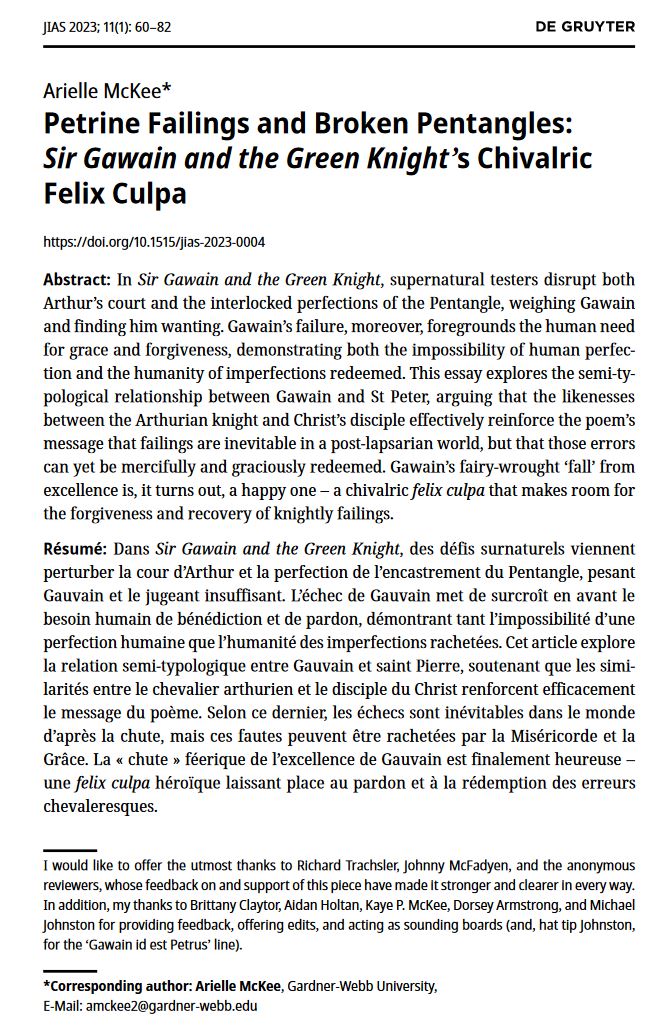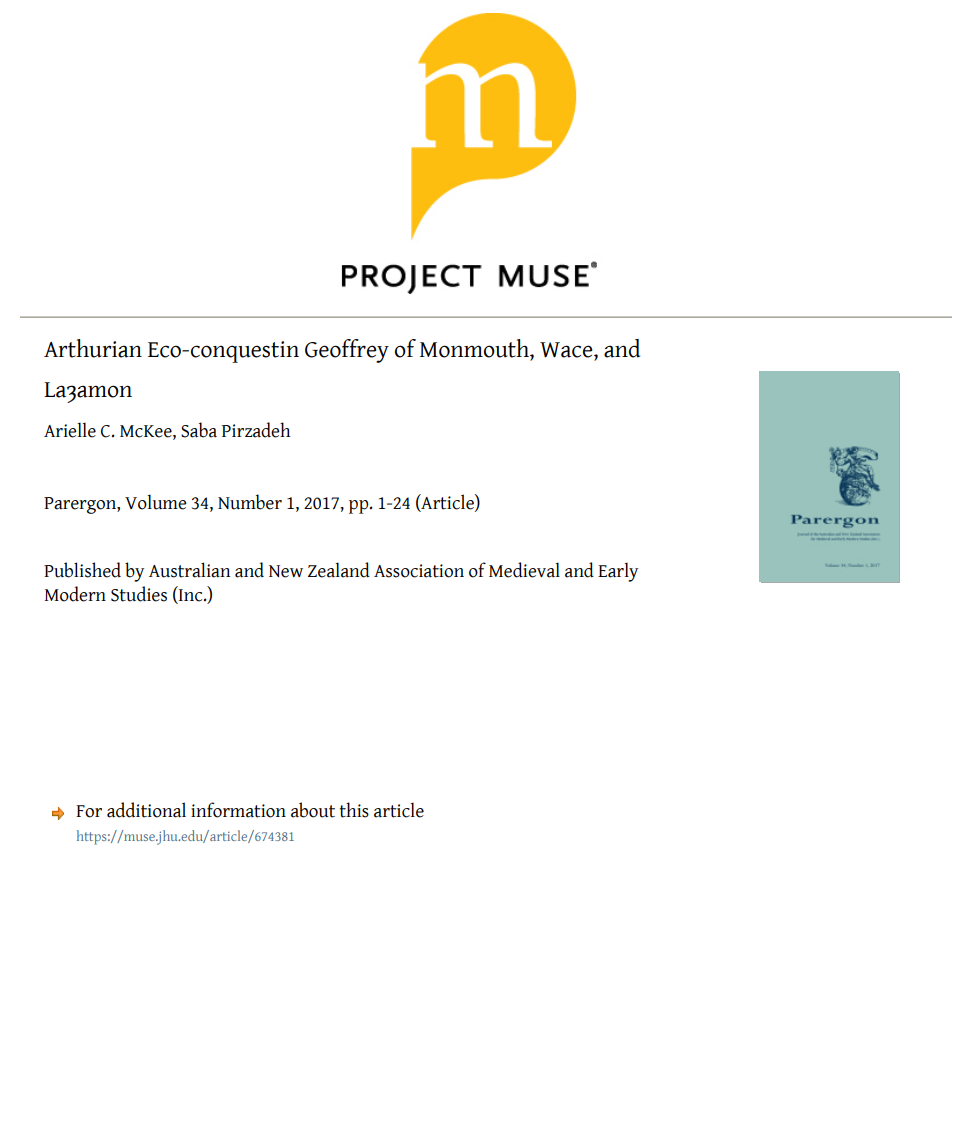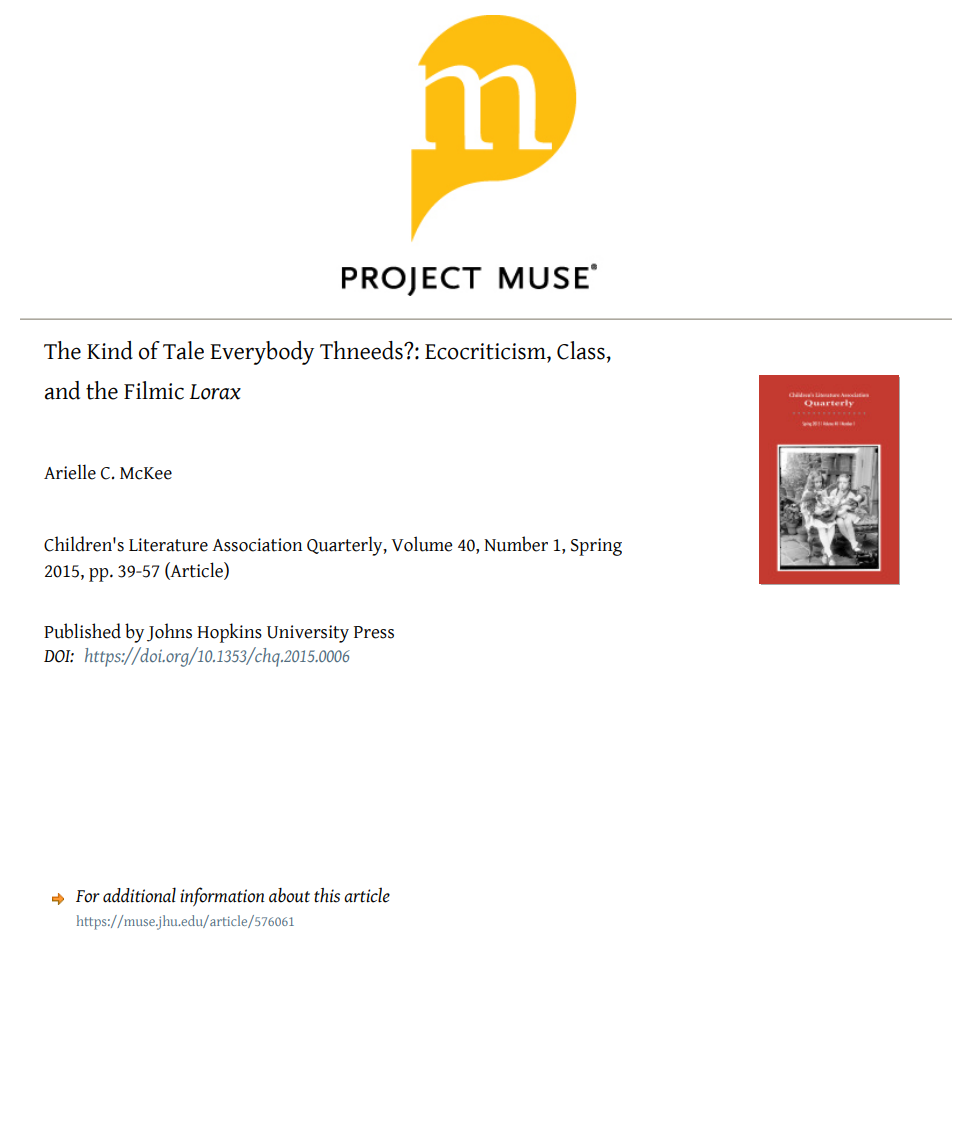In-Progress
Journal Articles
McKee, Arielle C. “Immanence Front: Transgression, Cosmic Redemption, and Fairy Movers in Sir Gawain and the Green Knight.” Arthurian Literature XL (2025), Accepted and Forthcoming.
McKee, Arielle C. “‘This is a story about control’: Consent, Sovereignty, and Reproductive and Political Futurity in Sir Degaré and Yonec.” In Progress.
Book Chapters
McKee, Arielle C. “(Im)Material Books, Oo-De-Lally Orality, and the Mouse ’ s Middle Ages.” Disney and the Middle Ages. Ed.s Christina M. Carlson, Mariah Cooper, and Joshua Parks. Reinterpreting the Middle Ages Series. Turnhout, Belgium: Brepols, Commissioned.
Editing Projects
Vikings, Knights, Elves, and Ogres: Essays in Honor of Shaun F.D. Hughes. Ed.s Eric Carlson, Dorsey Armstrong, and Arielle McKee. Kalamazoo, MI: Medieval Institute Publications, Forthcoming.
Approaches to Teaching the Arthurian Tradition. Ed.s Dorsey Armstrong and Arielle McKee. The Modern Language Association of America, In Progress.
Scholarly Publications
 McKee, Arielle C. “Petrine Failings and Broken Pentangles: Sir Gawain and the Green Knight’s Chivalric Felix Culpa.” JIAS 11.1 (Fall 2023): 60–82. https://doi.org/10.1515/jias-2023-0004.
McKee, Arielle C. “Petrine Failings and Broken Pentangles: Sir Gawain and the Green Knight’s Chivalric Felix Culpa.” JIAS 11.1 (Fall 2023): 60–82. https://doi.org/10.1515/jias-2023-0004.
 McKee, Arielle C. and Saba Pirzadeh, “Arthurian Eco-conquest in Geoffrey of Monmouth, Wace, and Laȝamon.” Parergon 34.1 (2017): 1-24.
McKee, Arielle C. and Saba Pirzadeh, “Arthurian Eco-conquest in Geoffrey of Monmouth, Wace, and Laȝamon.” Parergon 34.1 (2017): 1-24.
 McKee, Arielle C. “The Kind of Tale Everybody Thneeds?: Ecocriticism, Class, and the Filmic Lorax.” Children’s Literature Association Quarterly 40.1 (2015): 39-57.*
McKee, Arielle C. “The Kind of Tale Everybody Thneeds?: Ecocriticism, Class, and the Filmic Lorax.” Children’s Literature Association Quarterly 40.1 (2015): 39-57.*
Editing – Scholarly Publication
“Teaching the Arthurian Tradition: A Special Cluster.” Arthuriana 32.4, Guest Editor: Arielle C. McKee, Summer 2023.
Digital Humanities Content
2019 | McKee, Arielle C. “Women’s Athletics in the 1920s.” in Voices, Identities, & Silences: Investigating 150 Years of Diversity in the Purdue Archives.
In-Progress Research
In extending and revising my dissertation research for article and monograph publication, I am seeking first to introduce additional, historical contextualizations—work which will include composing a new chapter on the evolution and real-world deployment of popular fairy lore in fifteenth- and early-sixteenth-century England. As I will discuss, fairies’ revolutionary literary function is reflected, in surprising ways, by historical evidence from late-medieval England—particularly in records related to the popular uprisings and rebellions of the time. In tracing these connections, I will examine some of the Paston letters, chronicle sources, and several legal records that show, for instance, that more than a few late-medieval bands of rebels purposefully identified either themselves or their leaders with fairyland or its monarchs.
Further, I hope to add to the book project discussions of several Middle English romances, such as The Turke and Sir Gawain, which I was not able to consider in my original dissertation work. In particular, by drawing on the exceptional work being done by premodern critical race scholars, I hope to explore how The Turke and Sir Gawain enmeshes fairy tropes and motifs with processes of racial formation, thereby suggesting a productive, otherworldly complication to Monster Theory-focused readings of alterity in Middle English texts.
My scholarly interests also extend to include environmental and young adult literature, and I have published work on these topics in the Children’s Literature Association Quarterly—an article which received the Judith Plotz Emerging Scholar Award: Honorable Mention—and in a co-written piece appearing in Parergon. My second project will thus bridge my primary and secondary interests, examining the contrasts between medieval wild men and Thomas Hoccleve’s more metropolitan depiction of mental illness.